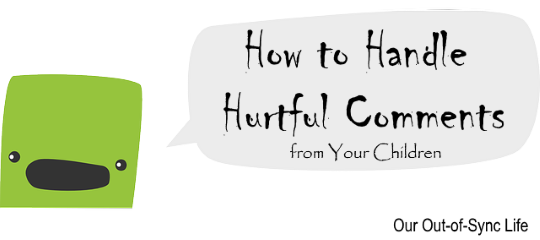I remember the first time that one of my children shouted at me, “I hate you!” Like a knife, I felt the blow right to the heart.
How could this child say such a thing? I must be doing something wrong! Panic. Fear.
Currently our Sweet Pea (age 9) is throwing out the statement, “You don’t like me…that’s why you ____.” She gets mad and lets me know that her anger is justified because I don’t like her. Or so she would like to make us all believe.
As I am growing in my understanding of parenting and God’s view of me, I take these comments much differently than I used to. Yes, the comments still sting but I am learning to step back, remove my emotions, and handle the situation with love.
Here are some tips that I have gathered.
Don’t React
I think the first thing we must determine is why the child (or even the adult) is saying hurtful comments. 99.9% of my experience as been that the person wants a reaction. They want you to apology (giving them control) or deny their comment (turning it into a debate).
If this is the case, the best response is to not give them either reaction.
Choose an Answer
Having a prepared answer for hurtful comments is very helpful. Choose a sentence or two and always response with it. When Sweet Pea spews her anger at me, I tell her “Aren’t you glad that’s not true.” Every. Single. Time answer with the same comment. This places the issue back in the child’s hands. The Early Childhood Love and Logic book, which I highly suggest, is filled with ideas like this and provides example lines to choose from.

What is Love?
The next option can be a one liner as well, but it is used in a little different manner. And the child’s personality and attitude would dictates its use.
When the child says something unkind, you respond back with I Corinthians 13. “Was what you just said loving?” You can continue, “Kind?” “Building up?”. These are yes/no answers and as long as the child says no, continue. Then say, “I want you to go to your thinking spot/room and think about how you could have responded better to me. When you are ready, come and tell me three things that are loving, kind, and build me up instead of tearing me down. Then we will talk about how you are feeling.”
If this is an option that you feel would work well with a child, I encourage you to discuss the topic at supper or a family meeting so that child understands examples of kindness, love, and building others up.
Talk Less
I am learning…slowly...that I talk too much. I believe the lie that my children can’t put two and two together so I have to spell out everything, remind them, and just in case they forgot, remind them again. I panic and think that properly using teachable moments requires turning everything into a sermon when in reality the fewer the words, the more power each hold. This is why the one liners are so powerful.
Do Over
This fifth option can be very effective for hormonally-driven preteens and teenagers. I use this option when I realize my kiddo has been bulldozed by emotions and realizes it. After a hurtful comment I say, “Would you like to start this conversation over?”. And if he or she has a repentant heart, they will be grateful and say, “Please.” And we start the conversation again, like the disrespect never occurred.
When They Are Correct
And then there are the times when my child simply spouts truth. I handled the situation wrong, let my own tone turn hurtful, or misplaced anger on my child instead of the real problem. In this situation, I must first seek forgiveness. Then with grace, we can discuss how the child should have responded with respect.
Hurtful comments are a fact of life. But instead of allowing them to produce drama, we can use them as a teaching tool to bring life.

